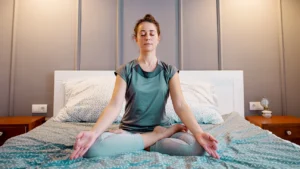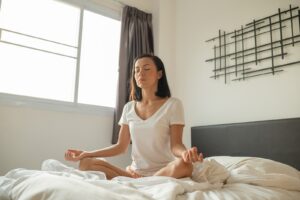It can be very frustrating if you have trouble falling asleep quickly. Most of us have tossed and turned as our minds race. Fortunately, science and experience have taught us many ways to help us calm down and prepare our bodies and minds for a good night’s sleep. Even if you only suffer from occasional insomnia, consciously using relaxation techniques can significantly improve the speed at which you fall asleep and how well you sleep.
In this article, we will discuss some of the best relaxation techniques that can help you fall asleep faster and get a better night’s sleep.
Understand the Importance of Relaxation
Before we delve into these methods, it is important to understand the importance of relaxing before bed. When your brain becomes overstimulated or anxious, chemicals such as adrenaline and cortisol are released into your body. Trying to sleep when these chemicals are supposed to keep you awake and alert is not a wise move.
Every relaxation method is designed to support your parasympathetic nervous system, which is responsible for rest and recovery. This slows your heart rate, relaxes your muscles, and prepares your brain to automatically fall asleep.
Establish a consistent bedtime routine
Doing something every night tells your brain that it’s time to relax. Going to bed and going to sleep at the same time every night keeps your circadian rhythm (your body’s alarm clock) in sync. Do something relaxing about 30 minutes before bed, such as reading a book, turning off the lights, or taking a warm bath.
Maintain the same routine. When you do the same thing every night to calm yourself down before bed, your body automatically begins to prepare for sleep before you even go to bed.
Breathe regularly and deeply
One of the fastest and most effective ways to calm down and reduce anxiety is to breathe deeply. The 4-7-8 breathing technique is a common one: breathe in through your nose for four seconds, hold your breath for seven seconds, and then slowly exhale through your mouth for eight seconds. This rhythm slows your heart rate and calms your mind, making it easier to fall asleep.
You can also try belly breathing. As you inhale, focus on the feeling of your belly expanding; as you exhale, focus on the feeling of your belly shrinking. This method can increase airflow and make you feel more relaxed.
Progressive muscle relaxation can help
With progressive muscle relaxation, each muscle group in your body first stiffens and then relaxes. Start at the feet and work your way up to the head. This removes the stress in your body that can prevent you from falling asleep.
Sink into bed and enjoy the peace and quiet as you focus on each part of your body. This not only relaxes your muscles, but also allows you to temporarily forget any problems or stress.
Visualization and guided imagery can help
Your brain is incredibly powerful and if you use it properly, it can help you sleep optimally. When you visualize, imagine a relaxing scene, such as a beach at sunset or a peaceful forest. Try to imagine the sounds, smells, and feelings of that place as clearly as possible.
Guided imagery takes this a step further. It uses a CD or app to guide you through a relaxing scene or story. This method can help you free yourself from chaotic thoughts and enter a dreamier state of mind.
Mindfulness or meditation can help
You don’t have to spend a lot of time or practice to become good at meditation. Simply sitting quietly and focusing on your breathing or chanting a calming text can help a lot. Mindfulness meditation teaches you to be present in the moment, to stay aware, and to be nonjudgmental about what you see or hear. This will help you release stress and relax.
If you’ve never meditated before, try an app that can help you fall asleep while you meditate. These tools often combine relaxing stories with background music or sounds from nature.
Reduce your screen time.
Cell phones, computers, and televisions emit blue light, which blocks the production of melatonin, the body’s natural sleep hormone. Avoid screen time for at least one to two hours before bed. If you must use electronic devices, set them to night mode or wear glasses with a blue light filter to reduce the impact.
Instead of looking at your phone, read a book, take notes in It is important to rest before going to bed at night. Because caffeine can stay in the body for a long time, it is best to avoid coffee, tea, and caffeinated soft drinks after lunch. Eating a large meal right before bed can also make you feel uncomfortable and make it harder to fall asleep.
If you are hungry before bed, eat something light that can help you sleep, such as a banana, nuts, or a small glass of warm milk.
Write down your thoughts
You may want to write down the fears or thoughts that keep you up at night in a book before you go to sleep. This process can help you clear your mind, release stress, and end the day on a positive note.
You can also write down the positive things that happened to you that day in a gratitude journal. Saying “thank you” at the end of the day can improve your mood and reduce stress, which can help you rest and sleep better.
Music or sounds from nature can help you relax
Music can have a powerful effect on your mind and body. Slow, relaxing instrumental or ambient music can help to lower your heart rate and calm your mind. Some people also find the sounds of nature, such as rain or ocean waves, very relaxing.
There are many apps and songs that can help you fall asleep. Try different sounds and see which one works best for you.
Final Thoughts
It’s not just happiness that can help you fall asleep faster. You can also create the right environment, develop healthy habits, and learn how to calm your mind and body before bed. If you practice these breathing techniques daily, your sleep patterns will change and you will wake up feeling refreshed and energized.
If you stick to these habits, they will become second nature and ensure that you get the restful sleep that your body and mind need.




